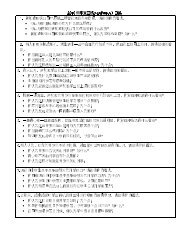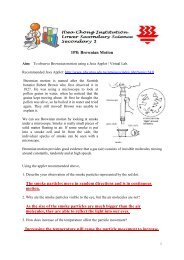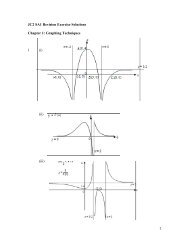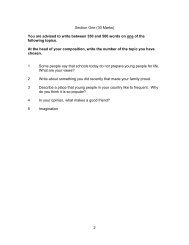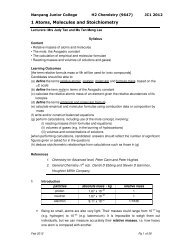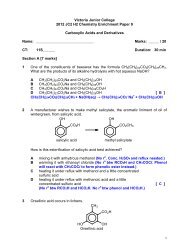Suggested Answers of BT2 Revision Package - ASKnLearn
Suggested Answers of BT2 Revision Package - ASKnLearn
Suggested Answers of BT2 Revision Package - ASKnLearn
- No tags were found...
You also want an ePaper? Increase the reach of your titles
YUMPU automatically turns print PDFs into web optimized ePapers that Google loves.
oooHigh level <strong>of</strong> integration increases vulnerability <strong>of</strong> smaller and more open economiesby exposing them more significantly to external demand conditions-‐ exacerbates economic problems: Xd and FDI as a proportion <strong>of</strong> AD is much higher for smaller and more open economies à economy becomes more vulnerable to external environment à economic activity becomes more volatile due to influence <strong>of</strong> trading partners’ economic situations on domestic economy à smaller and more open economies less stable than large and less open ones, who depend more on domestic demand for economic growth. Free movement <strong>of</strong> labour arising from globalisation has significant impact inequity on the domestic economy, especially on wages. §§Influx <strong>of</strong> foreign workers increases supply <strong>of</strong> workers than reducing wages. This is especially important because foreign workers tend to form a larger proportion <strong>of</strong> workers in small and open economies such as Hong Kong and Singapore. Wages <strong>of</strong> low skilled workers may become especially depressed because influx <strong>of</strong> foreign low-‐skilled worker, in the Singapore example, increase supply more than demand, causing wages to decrease. Skilled workers, on the other hand, find their wages increasing as the growth in demand for them outstrips supply. §ooo§§This worsens inequity more significantly for small and open economies who are more reliant on foreign workers. Remittance <strong>of</strong> wages by foreign workers may also worsen BOP CA through outflows via the income balance/ invisible balance in the current account. Larger dependence on FDI flows may worsen BOP CA <strong>of</strong> small and open economies more significantly: Repatriation <strong>of</strong> pr<strong>of</strong>its may worsen BOP CA through outflows via the income balance/ invisible balance in the current account. Might be a problem for countries managing their exchange rates as this reduces the size <strong>of</strong> trade surpluses and thus reduces the rate <strong>of</strong> accumulation <strong>of</strong> foreign reserves à less ability to manage exchange rates thus worsening economic instability. Currency might depreciate. For small and open economies that are highly reliant on imports, this may lead to import cost push inflation as depreciation makes foreign intermediate and final goods and services more expensive in domestic currency terms. [Support using AD-‐AS diagram]. Anti-thesis: Large and less open economies may benefit more than small and openeconomies:






